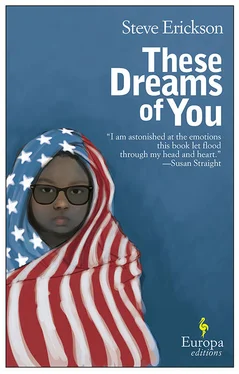Steve Erickson
These Dreams of You
For Lori, Miles and Silanchi
But years later, on a night in early November, when the wind comes in like a swarm, Alexander Nordhoc sits in the rocking chair — that he borrowed but never gave back — where his wife used to breast-feed their son.
It’s eight o’clock where he is, in one of the canyons on the edge of Los Angeles. It’s ten o’clock in Chicago, and thousands of people sweep across the TV screen and the same park where, forty years ago, police and protesters rioted at the scene of a great national political convention, and Nordhoc’s country questioned all its possibilities.
Alexander’s four-year-old daughter Sheba, adopted nineteen months before from an orphanage in Ethiopia, sits on his lap. Sheba is the color of the man on the television, in whose form the country now has imagined its most unfathomable possibility. Alexander, who goes by Zan, is the color of everyone else in the family, including his wife Viv and his son Parker, whose twelfth birthday happens to also be on this day.
With the announcement of the man’s election, bedlam consumes the living room. “He won!” Parker explodes, leaping from the couch over a low white formica table that’s in the shape of a cloud. “He won! he won! he won!” he keeps shouting, and Viv cheers too. “Zan,” Parker stops, baffled by his father’s stupefaction, “he won.” He says, “Aren’t you happy?”
On the television is the image of an anonymous young black woman who, in the grass of the park, has fallen to her knees and holds her face in her hands. Do I have the right, Zan wonders, as a middle-aged white man, to hold my face in my hands? and then thinks, No. And holds his face in his hands anyway, silently mortified that he might do something so trite as sob.
It’s a country that does things in lurches. Born in radicalism, then reluctant for years, decades, the better part of centuries, to do anything crazy, until it does the craziest thing of all. But it’s also a country — inherent in its genes — capable of imagining what cannot be imagined and then, once it’s imagined, doing it.
Six years before, another president, a white privileged Texan, swaggered across the deck of an aircraft carrier in a pilot’s jacket, a banner unfurled behind him proclaiming the end of a war that, in fact, was only beginning. It was an image that the country embraced almost as much as it believed it. Now, a black Hawaiian with a swahili name? It’s science fiction, Zan thinks. Or at least the sort of history that puts novelists out of business.
The radio station the next day, from where Zan broadcasts four times a week a three-hour music show, he announces following the first set, “The Sam Cooke record — the greatest ever made — was for what happened last night. Forty-five years after the song was recorded. . but then all the song says is that a change will come, not how fast, right?” By the time the song was released as a B-side, the singer was murdered in an L.A. motel under tawdry circumstances. “But is it just me,” Zan asks, “or when he goes from that bridge into the final verse, does he redeem not only anything he ever did — including whatever it was that got him shot — but everything I ever did too?”
The national anthem of dreams deferred, sung from the grave by a ghost who doesn’t know he’s dead. “Everything else,” Zan goes on, “was for the kids. The hip-hop manifesto about brushing the dirt off your shoulder, that’s for my twelve-year-old son who’s gone gangsta lately, though at this point I’m sure he thinks the song is impossibly old-school, being as it’s more than half an hour old. And the really old-school one about the lovers at the Berlin Wall—‘What’s the Berlin Wall, Poppy?’—who get to be heroes just for one day? That’s for my four-year-old Ethiopian daughter, who I guess can’t get enough of British extraterrestrials in dresses.”
Zan has no idea if anyone actually listens to him. The station has about a megawatt to its name. Viv catches the broadcasts on her car radio for the thirty seconds she’s in range while driving the canyon boulevard; when she drops off Parker at school, the boy turns the radio down because the possibility some of his homies might hear it is too appalling. He furiously denies that it’s his father’s voice.
The four-year-old Ethiopian glam-rocker is the only one in the family not thrilled by the election result. Sheba has been the household’s sole supporter of the opposing candidate, a man the age of grandfathers and the color of snow, neither of which the small girl has known.
Zan has three theories about Sheba’s enthusiasm for this candidate. The first and most comfortable is that in fact he does remind her of Viv’s father, who died two years before she was born and whom she sees in all the family photos. The second theory, more vexing if not too unsettling, is that she’s just messing with everyone’s heads.
The third and most troubling theory is that in her four-year-old soul she’s already come to believe the color of snow is preferable to the color of. . well, pick your racist poison — chocolate? coffee? mud? With what brown does she associate? Since she came to live with the Nordhocs, she’s noted more than once that her skin is one color and Zan’s, Viv’s and Parker’s another. How come, the girl asks resentfully, returning from preschool where there are no other black children, you get to have light skin while mine is darker?
Dismayed, Zan isn’t sure he’s heard right. Was that really the way she put it? “Yours is lighter,” she points out again, pulling at his arm and thrusting her thumb in her mouth.
“It is lighter,” he says, “yours is darker and it’s beautiful. Some people have light skin and some have dark. Some have light hair and some have dark.”
“The man who sings the hero song has red hair.”
“Yes.”
“Mama has blue hair.”
“There you go. Turquoise, actually.”
“What’s turquoise?”
“A kind of blue. Blue-green.”
“Is it really blue or did she make it blue?”
“She made it blue.”
“Why?”
“She likes it. It matches her eyes. Some people have light or dark eyes. Some people are tall and some aren’t.”
Is this the way to answer the question? Is it better than “Because you’re black and we’re white,” if she doesn’t yet have a concept of black and white? Or is it an answer that only a naïve white person can give?
On the other hand, Sheba was adopted in the first place out of white naïveté, though less on the part of Viv who lived in Africa as a girl. Viv’s father was the city manager of Mogadishu — between Ethiopia and the sea — a freelancer whose career back home in the Midwest was subject to local elections, hired to bring running water and passable roads to a city half a world away. For Viv that was the year (her twelfth, which is to say when she was Parker’s age) of other kids’ parents abducted in the night never to be seen again, public hangings that were a social occasion, the ocean’s edge lined with the innards of gutted camels that attracted sharks when the reefs were breached, and, on a beach against the Indian Sea under an African moon, movies broadcast against a slab of rock. When Viv saw the movie about the monolith surrounded by apes who hurl a bone into the sky that becomes a space station, it actually was on a monolith.
Читать дальше











